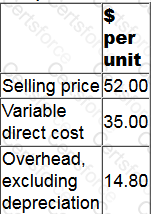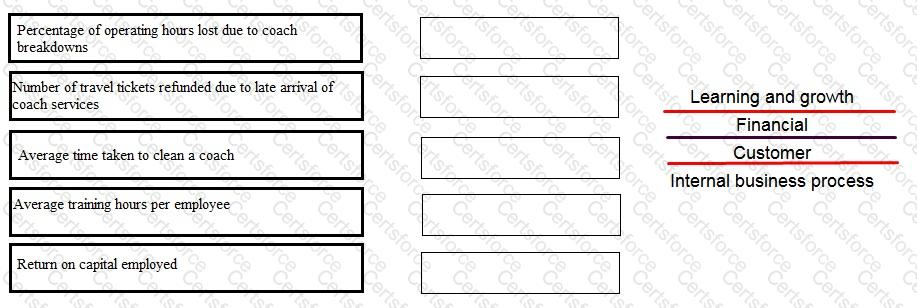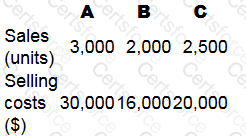A company is investing in a huge diversification project. The plan is to develop and sell a whole new product line that they have never sold before. They've already started a massive marketing campaign for this new
product line and they are getting good feedback in their market research.
They've had to use debt funding in order to finance the project, but they hope that the returns will be worth the investment and restructuring. If they are successful they will be a step ahead of all their competitors and offer
something none of them can.
What is the risk appetite of this company?
A long established organization has recognised the need to make urgent changes to the way it operates in order to remain competitive. The organization wishes to dramatically improve its performance through a fundamental rethinking and radical redesign of its existing activities.
Which of the following techniques should be used to achieve this?
A manufacturing company has recently introduced a Total Quality Management (TQM) system. The company has invested heavily in the education and training of its staff, in addition to implementing new product design engineering. There is a plan to sample units from each batch of products manufactured to test for errors, although this has not yet been implemented due to budget constraints.
The company is experiencing high levels of customer complaints, with many faulty units being returned by the customer for refund or replacement. Sales revenue has fallen recently, mainly due to negative press coverage linked to dissatisfied customers.
Select the statement MOST likely to apply.
A company is considering investing $680,000 in a machine to manufacture a new product. A consultant has been appointed to advise on the investment and the company is committed to paying $10,000 to the consultant in year 1, even if the project does not go ahead.
300,000 units of the new product will be produced and sold each year. Unit cost and revenue information based on this level of output is as follows.

60% of the overhead cost is variable. Of the remainder, 10% consists of allocated head office overheads.
The selling price will increase by 2% each year in line with inflation, beginning in year 2. Fixed price contracts mean that all unit costs will remain unaltered.
Taxation information:
• 100% first year allowance will be available for the purchase of the machinery.
• The taxation rate is 30% of taxable profits, payable in the year after that in which the liability arises.
For the purpose of deciding whether to proceed with the investment, what is the relevant cash flow in year 2?
In an inflationary environment which is the correct way of calculating net present value (NPV)?
A Balanced Scorecard is being prepared for a coach passenger transport company. Place the correct perspective of the Balanced Scorecard against each performance measure.

An organization has a decentralized structure in which division A supplies division B with an intermediate product for which there is no external market. Division B carries out further processing and then sells the final product on the external market. Due to organizational policy the current transfer pricing basis is variable cost.
The manager of division A has stated, "The current transfer price is unfair because it does not enable us to recoup our costs".
The manager of division B has stated, "The current transfer pricing system enables us to quote competitive prices for the finished product".
The Chief Executive of the organization is considering imposing a transfer pricing policy that uses dual pricing.
Dual pricing would:
A company has a 31 December year end and pays corporation tax at a rate of 30%. Corporation tax is payable 12 months after the end of the year to which the cash flows relate. The company can claim tax allowable depreciation at a rate of 25% reducing balance. It pays $1 million for a machine on 31 December 20X4. The company's cost of capital is 10%.
What is the present value of the benefit of the first portion of tax allowable depreciation?
An airline company has operated passenger flights with low ticket prices to various airports from a busy airport for several years. It now faces increased competition on a number of its routes and has decided to use the balanced scorecard to monitor its performance.
Which of the following statements are correct?
Select ALL that apply.
One of a company's products is sold to three customers: A, B and C. These customers do not buy anything else from the company. The product costs $20 per unit to manufacture and is sold to the customers for $50 per unit.
The following table shows data for sales and selling costs for the latest period.
Delivery costs of $32,000 and general overheads of $60,000 were incurred during the period.
Deliveries to customers A and B were made by a courier in batches of 100 units; the courier charged $300 for each batch delivered to customer A and $400 for each batch delivered to customer B. Deliveries to customer C were made by mail in batches of 10 units at a cost of $60 per batch.

Which of the following statements is correct?